les Nouvelles April 2019 Article of the Month
Confidentiality In FRAND Licensing After Huawei v ZTE: National Courts in Europe Searching For Balance
Ericsson,
Syndic Lawyer/IPR Researcher,
Munich, Germany
Ericsson GmbH,
Director IPR Policy and Legal Academic Research,
Herzogenrath, Germany
Abstract
In a landmark decision in the matter Huawei v ZTE, the Court of Justice of the European Union (CJEU) established a well-balanced framework for the licensing of Standard Essential Patents (SEPs) on Fair, Reasonable and Non-Discriminatory (FRAND) terms and conditions. Following this judgement, national courts in Europe have been providing further guidance on several key questions related to the ruling, as illustrated in summary infographic starting on page 215. A significant portion of this case law has been developed in Germany. In their effort to interpret the Huawei v ZTE FRAND framework, German courts have repeatedly addressed an issue with significant practical relevance for the licensing of SEPs, which the CJEU did not expressly raise in its decision: The protection of confidentiality in the context of FRAND licensing negotiations and FRAND related litigation. The present paper examines whether the efforts of the German jurisprudence have produced viable solutions in this respect so far.
Introduction
The evolving digitalization of the economy and particularly the roll-out of the Internet of Things (IoT) are expected to trigger innovation and generate substantial economic growth.1 The driving forces behind the IoT are connectivity and interoperability standards developed within Standard Development Organisations (SDOs). Standards rely on technological contributions, some of which are protected by patents. Thus, the implementation of standardised technologies requires access to those patents that are essential for complying with the standard's specifications, i.e. Standard Essential Patents (SEPs). As a rule, SDOs request SEP holders to commit to make their patents accessible to standards implementers through licenses on Fair, Reasonable and Non-Discriminatory (FRAND) terms and conditions. FRAND enables, on the one hand, implementers to benefit from embedding high-quality interoperable standardised technology in their products and services at reasonable costs; on the other hand, FRAND ensures a fair return on investment for the SEP holders, providing the necessary incentives to continue engaging in standardisation.
There is no "one-size-fits-all" approach when defining the content of FRAND,2 as FRAND terms and conditions need to be determined in good faith negotiations between SEP holders and standards implementers. In this context, another issue is highly debated: The availability of injunctive relief to SEP holders. Does the FRAND commitment towards the SDO limit a SEP holder's right to injunctive relief against the infringement of its patents and, if so, under which conditions and to what extent?
In 2015, the Court of Justice of the European Union (CJEU) delivered its landmark decision on the availability of injunctive relief to holders of FRAND-accessible SEPs in a case involving Huawei and ZTE (Huawei judgement).3 With the Huawei judgement, the Court made it clear that, in principle, injunctive relief for infringement of SEPs was available, as the FRAND commitment did not change the nature of the patent right. However, the Court imposed affirmative conduct obligations to both SEP holders and standards users (Huawei framework), linking the availability of injunctive relief for the SEP holder—respectively the effective defence against such a request on part of the SEP user—to the compliance with the obligations each party involved in FRAND licensing is subject to. This way, the Court confirmed that FRAND is a two-way street; both parties are obliged to negotiate in good faith.
Following the spirit of the Huawei judgement, national courts throughout Europe have been fleshing-out the Huawei obligations, providing stakeholders with further guidance on the FRAND framework. One topic which courts, particularly in Germany, have recently repeatedly addressed is the protection of confidentiality in the context of FRAND licensing. This question is of key importance both in ongoing FRAND negotiations and in litigation regarding the availability of injunctive relief to SEP holders.
After a summary presentation of the Huawei framework, this paper will discuss the efforts undertaken by German courts to provide clarity with respect to the protection of confidentiality in FRAND licensing so far. The conclusions drawn will be summarized in the final part of the paper.
The Huawei Framework
As illustrated in the infographic, when laying down the mutual obligations imposed on SEP holders and SEP users participating in FRAND licensing, particularly the German courts have interpreted the Huawei framework as being a "step-based" approach where obligations are incremental, so long as each party has fulfilled their obligations.
The graduated proceeding established by the Court in the Huawei judgement commences with SEP holder's notification of infringement. The SEP holder is obliged to notify the implementer of the (infringing) use of its SEPs embedded in the relevant standard, "by designating that SEP and specifying the way in which it has been infringed."4 In Germany, it is considered sufficient to use claim charts customarily exchanged in licensing negotiations5 (see infographic Step 1).
After having received SEP holder's notification of infringement, the implementer must diligently express its willingness to conclude a licensing agreement on FRAND terms (see infographic Step 2). In other words, the implementer has to declare that it is willing to "take a license on whatever terms are in fact FRAND."6 If the implementer fails to do so within a reasonable time frame, depending on the circumstances of each individual case, an injunction may be sought against him
If the implementer effectively expresses its willingness to enter into a FRAND licensing agreement, the SEP holder is then obliged to present the implementer with a written offer for a FRAND license, "in accordance with the undertaking given to the standardisation body, specifying, in particular, the royalty and the way in which it is to be calculated"7 (see infographic Step 3). SEP holder's licensing offer must contain all essential contractual terms and specify the conditions in a way that, in order to conclude a licensing agreement, the implementer only has to accept the offer.8
The receipt of SEP holder's licensing offer triggers the implementer's obligation to diligently (that is without delaying tactics) respond to that offer, "in accordance with recognised commercial practices in the field and in good faith."9 The obligation to respond does not mean that the implementer is obliged to accept SEP holder's offer; but in case it does not agree with the terms offered, the implementer must promptly make a specific FRAND-conform written counter-offer to the SEP holder,10 which must inter alia specify the royalty calculation11 (see infographic Step 4)
SEP-holder's reaction to the counter-offer creates the following procedure: If the counter-offer is accepted, a license settling the relationship between the parties will be concluded. In case the SEP holder rejects the counter-offer, the alleged infringer is held to provide appropriate security, for instance by "providing a bank guarantee or by placing the amounts necessary on deposit," as well as to render accounts with respect to prior acts of use of the SEPs in question,12 immediately after the rejection of the counter-offer13 (see infographic Steps 5 and 6). If the standard implementer fails to do so, it is again exposed to the risk of an injunction
Confidentiality Within the Huawei Framework
As seen from the above, the roadmap for FRAND licensing laid down in the Huawei judgement does not directly address the issue of confidentiality. Apart from requesting both sides involved in FRAND licensing to act in good faith and recognise commercial practices, the CJEU refrained from formulating concrete conduct obligations for either party with respect to the exchange and use of confidential information
The protection of confidential information is of key importance both in FRAND licensing negotiations as well as in FRAND-related litigation. The determination of FRAND requires a comprehensive exchange of information between the parties. This includes also sensitive business information of the negotiating parties that needs to be kept confidential, particularly vis-á-vis competitors (such as information about past sales, sales forecasts, the geographic distribution of future sales, or collaboration agreements). In order to ensure confidentiality, it is, therefore, very common that the parties enter into a Non-Disclosure Agreement (NDA), prior to the exchange of confidential information. An NDA obliges the parties to restrict access to or by third parties of confidential information or material
There are, however, cases in which a party refuses to enter into such an agreement or delays the conclusion of an NDA without due reason. Since the party depending on the protection of its confidentiality interests will not share relevant information prior to signing an NDA, refusal to agree to an NDA usually results in a deadlock in negotiations or court proceedings. In this case, the following question arises: What impact does one party's refusal to sign an NDA have on the obligations imposed on parties by the CJEU to engage in FRAND licensing negotiations?
The Huawei judgement does not provide an expressed answer to the above question. However, the German courts have drawn certain conclusions from the judgement to clarify the position. Taking as a starting point that the determination of FRAND within the Huawei framework requires good faith conduct from both SEP holders and implementers, the appeal court (Oberlandesgericht) of Düsseldorf in Germany attempted to strike a balance between the interests of the parties involved in FRAND licensing in a decision delivered in July 2017
The case involved a FRAND-accessible SEP reading on the ADSL2+ and the VDSL2 standards.14 Since the specification of the royalty calculation required the disclosure of confidential information, the SEP holder requested the SEP user to sign an NDA, which the latter refused. Subsequently, the SEP holder filed a motion for a preliminary injunction against the SEP user, which was, however, dismissed by the appeal court of Düsseldorf in the second instance. Although the court based its decision to reject the injunction request mainly on other considerations, it also laid down its views regarding the treatment of confidentiality within the Huawei framework. In particular, the appeal court of Düsseldorf held that the unjustified refusal of an implementer to enter into an NDA does not release the SEP holder from its obligation under the Huawei judgement to make a FRAND offer and specify the underlying conditions, including the price calculation.15 Implementer's refusal to sign an NDA shall, however, ease SEP holder's burden to provide the implementer with detailed explanations regarding the justification of its licensing conditions, to the extent required for protecting its justified confidentiality interests.16 Instead of detailed information, "merely indicative observations" would, basically, suffice.17 Consequently, the implementer cannot raise the lack of specificity as a defence to an injunction request, where the lack of specificity results from the implementer's refusal to enter into an NDA.18
A Special Case: Comparable Licensing Agreements
In general terms, the above approach could provide a balanced solution when it comes to the protection of parties' own confidential information in FRAND licensing negotiations or FRAND related litigation. There are, however, doubts whether it can adequately address the more complex issue of the protection of confidential information of third parties. This issue arises particularly in litigation when SEP holders produce existing licensing agreements with third parties, as a means to establish the FRAND conformity of the licensing offers made to implementers (comparable agreements)
The use of comparable agreements to demonstrate that a particular licensing offer is indeed FRAND is, in general, recognised by courts worldwide as an adequate (and, by some, as the best) option: By providing similar terms and conditions than those accepted by other similarly situated SEP users, the SEP holder can show that its offer is FRAND; the more agreements, the higher the likelihood that the comparable offer is considered FRAND.19
Licensing agreements contain, however, very sensitive confidential business information, such as business plans of the parties to the contract, sales forecasts, pricing terms, purchase commitments, collaboration agreements, technology transfers or guaranteed minimum payments. Licensees may not wish such information to enter the public domain as competitors would gain significant commercial advantages by gaining access to the core of their rivals' business strategy. As a rule, it is not surprising that licensing agreements contain detailed confidentiality clauses, preventing the SEP holder from disclosing confidential information, unless under limited circumstances such as a direct court order to do so
Again, the Huawei judgement does not provide concrete guidance on how to approach these issues. In two consecutive decisions delivered in the same matter on 16th December 2016 and 17th January 2017, the appeal court of Düsseldorf attempted to incorporate the spirit expressed by the CJEU in the Huawei judgement in a practically viable solution.20In this case, the SEP holder had obtained a judgement against the implementer, recognising the latter's obligation to pay damages to the SEP holder and ordering him to render accounts regarding to past sales of infringing products. In the appeal proceedings, one issue still in dispute was whether SEP holder's licensing offer prior to the proceedings, particularly the offered royalties, was FRAND. The SEP holder explained its calculation mainly based on comparable agreements. However, the SEP holder only disclosed these comparable agreements to the court; the implementer was presented with redacted information and agreements. Moreover, the SEP holder requested the court to order a procedure of restricted disclosure, similar to an "attorney-eyes-only" designation known in other jurisdictions. Full information regarding its royalty calculation, including the presentation of unredacted comparable agreements, should be made only to implementer's external legal counsels, who would be obliged by the court to maintain the full confidentiality of these agreements towards everyone, including their clients
In its first decision dated 14th December 2016, the appeal court of Düsseldorf rejected SEP holder's request, but 'encouraged' the parties to enter into an NDA. The court found that the German rules of Civil Procedure do not provide a legal basis for granting an order in the form requested by the SEP holder.21 Moreover, such an order would exclude the implementer's right to be heard with respect to the SEP holder's royalty calculation, in breach of Article 103 Sec. 1 of the German Constitutional Law (Grundge-setz).22 The court, nevertheless, stressed that, as a rule, it can be expected from the implementer to enter into an NDA reinforced by a contractual penalty with the SEP holder.23 Implementers are obliged to facilitate FRAND licensing negotiations to the best of their ability; this includes also taking justified confidentiality interests of the SEP holder into account.24
Based on these considerations, the Appeal Court of Düsseldorf modified its first decision by a second judgement delivered on 17th January 2017. The court again rejected SEP holder's request, but went further than its prior decision and ordered the implementer to present to the SEP holder an offer for an NDA, incorporating particularly the following conditions, within a deadline of three weeks:
- The confidential information should be used only in the context of the present litigation
- The information would be made available only to four company representatives of the implementer (as well as any experts engaged by the implementer in the ongoing litigation)
- These persons shall be themselves obliged to confidentiality by the implementer
- In case confidentiality was breached, the implementer shall be liable for payment of a contractual penalty amounting to EUR 1 million to the SEP holder.25
This line was followed by the District Court (Landgericht) of Düsseldorf in a later judgement, delivered in July 2017, referring to a FRAND-accessible SEP reading on the 2G wireless telecommunications standard.26 After licensing negotiations between the parties failed, the SEP holder filed a suit for infringement against the implementer. During the proceedings, the SEP holder made two licensing offers to the implementer without, however, fully disclosing the information on which its royalty calculation was based, including any comparable agreements it relied on. In order to do so, the SEP holder requested the implementer to sign an NDA, which the latter refused. In its reasoning the District Court of Düsseldorf repeated that standards implementers are, in general, obliged to promote FRAND licensing negotiations which also includes the obligation to enter into an NDA with the SEP holder.27 Implementer's refusal to sign an NDA does not make him per se an "unwilling" licensee in terms of the Huawei judgement;28 such behaviour only entitles the SEP holder to present its royalty calculation in a less concrete manner, particularly to redact or omit confidential information, including comparable agreements. The court made this option, however, subject to an additional requirement: The SEP holder has to request the conclusion of an NDA as soon as possible, usually together with the notification of infringement.29 In the present case, the SEP holder had failed to do so in the eyes of the court
The above understanding was confirmed by the Appeal Court of Düsseldorf in a recent ruling dated 25th April 2018.30 The case involved a third party's motion to inspect the court files in infringement pro-ceedings brought by the SEP holder against the SEP user. The motion had been dismissed by the Court of First Instance, as far as (alleged) confidential information of the SEP holder, including comparable licenses, were concerned. The Appeal Court set this ruling aside and requested the Court of First Instance to (re-)examine whether the material deemed as confidential had this quality. Insofar, a high burden of proof rests on the SEP holder.31 However, if the information is established to be confidential, access to such material must be denied, unless the third party enters into an NDA with the SEP holder and actually abides by the NDA.32 In this respect, the SEP holder has to actively pursue the conclusion of an NDA.33 In case that the third party breaches the NDA or acts as it had no legal effect, access to (further) confidential information shall again be denied.34
Conclusions
Since the Huawei judgement national courts in Europe have been constantly evolving the framework for FRAND licensing established by the CJEU, providing further guidance to stakeholders on several key issues (see infographic)
Recently, German courts have attempted to shed more light on a topic with significant practical rele-vance; the protection of confidentiality in FRAND licensing. Although not clearly addressed in the Huawei judgement it may be a critical element in ruling on whether the parties to licensing negotiations have discharged their obligations under the Huawei framework, as imposed by the CJEU in considering whether the seeking of an injunction may be available. In doing so, the courts made clear that justified confidentiality interests of the parties, and particularly those of the SEP holder, as well as third party confidentiality interests, need to be considered. The general notion of good faith underlying the Huawei framework therefore includes the obligation to take into account justified confidentiality interests of the counterparty
Imposing an obligation on the SEP user (and third parties seeking access to court files in ongoing in-fringement proceedings) to enter into an NDA with the SEP holder, as suggested by the Düsseldorf courts, appears, however, to fall short of the needs to protect confidentiality in connection with comparable agreements. Even if SEP holders and SEP users enter into an NDA with the content suggested above by the Appeal Court of Düsseldorf, significant legal concerns remain attached to the disclosure of comparable agreements signed by the SEP holder with potential competitors to the SEP user
First, SEP holders facing litigation in Germany still risk breaching confidentiality clauses contained in comparable agreements, since such clauses usually contain the exception that confidential information can only be disclosed in limited circumstances, such as if required by court order. However, an NDA concluded with a potential new licensee does not have the legal status of a court order
Second, restricting access to comparable agreements only to four representatives of the implementer does not ensure that confidential information will not be (mis-)used, in order to gain commercial advantages over competitors. For instance, if sensitive business information contained in comparable agreements is made accessible to SEP user's representatives assigned with the licensing of intellectual property rights, despite the obligation to use such information only in litigation, there is no way for effectively preventing these persons from using the knowledge already gained in further licensing negotiations in a strategic manner
The (mis-)use of confidential information extracted from comparable agreements could, in turn, negatively impact the FRAND licensing environment as a whole. Implementers with insights in licensing agreements of their competitors will be tempted to "cherry pick" and push through the most favourable licensing conditions from different agreements in their own future licenses, without considering the overall circumstances, under which each comparable agreement was concluded. This could discourage flexibility in FRAND negotiations: SEP holders confronted with such requests could tend to offer the same conditions to all implementers, in order to avoid being faced with un reasonable demands that do not take into account the concrete circumstances of each individual case
It is to be noted that this is not a theoretical threat: As Apple pointed out, when asking a US judge not to disclose its licensing agreements with a SEP holder involved in litigation against another SEP user, "[i]n Apple v. Samsung, the court found that Samsung had used Apple's confidential licensing information in subsequent licensing negotiations with Nokia and in preparation for an arbitration with Ericsson, even though in that arbitration, discovery of Apple's licenses had not been obtained. (Song Decl., Ex. C (Apple Inc. v. Samsung Elecs. Co., No. 11-CV-01846-LHK, Dkt. No. 2934, at 4-6 (N.D. Cal. Jan. 29, 2014.)." 35
The solutions developed by German courts so far are still not able to comprehensively address the special issue of the protection of confidentiality in connection with comparable agreements. Although comparable agreements are generally recognised as an appropriate mean for establishing the FRAND-compatibility of SEP holder's licensing offer to the implementer in terms of the Huawei judgement, their actual use is usually hindered by confidentiality concerns. The conclusion of NDAs between SEP holders and implementers suggested by the Düsseldorf courts in this respect is a measure that cannot fully address such concerns, as the 'attorney-eyes-only' procedure adopted in other countries do. Moreover, for ensuring that confidential information contained in comparable agreements will not be (mis-)used by implementers for gaining commercial advantages over competitors, further reaching means will be required (in litigation, for example, mechanisms allowing for a restricted disclosure of comparable agreements only to SEP user's external legal counsels and experts). It should be expected that national courts in Europe will assume the task of further developing the Huawei framework in this direction in the future.
Available at Social Science Research Network (SSRN): https://ssrn.com/abstract=3218533.
Negotiating licenses for essential patents in Europe: Guidance from national courts
Increased clarity provided on the principles established by the Court of Justice of the European Union in Huawei v ZTE
The Court of Justice of the European Union clarified, in Huawei v ZTE (Case No. C-170/13), European law relating to the availability of injunctive relief for infringements of FRAND-based standard essential patents. In doing so, the Court provided a legal framework focused on the good faith conduct to be expected of both parties. Since the Court's decision in 2015, national courts have been steadily exploring the scope of these obligations, providing further clarity on what is or is not to be considered appropriate behaviour. Below is a summary of these steps drawn from 4iP Council's post-Huawei v ZTE case search tool
This information is not intended as legal advice and, in the event of dispute, independent advice should be sought. In addition, the precedential nature of these decisions depends on the jurisdiction and instance in which they were delivered.
Huawei v ZTE process
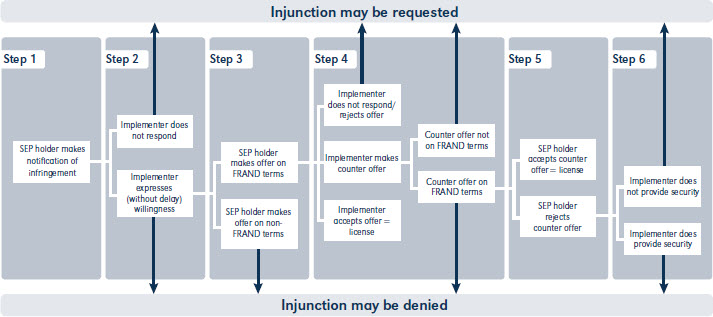
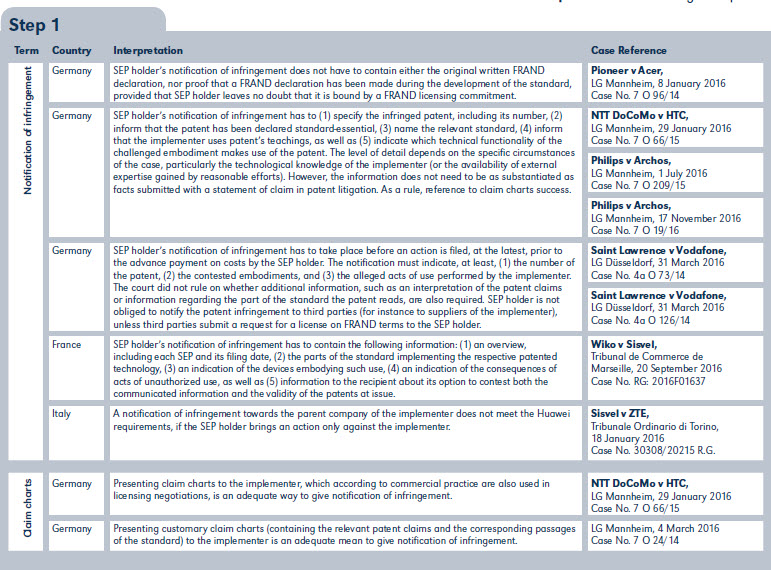
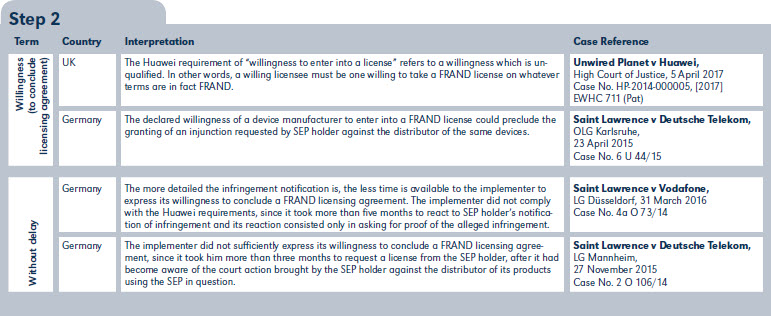
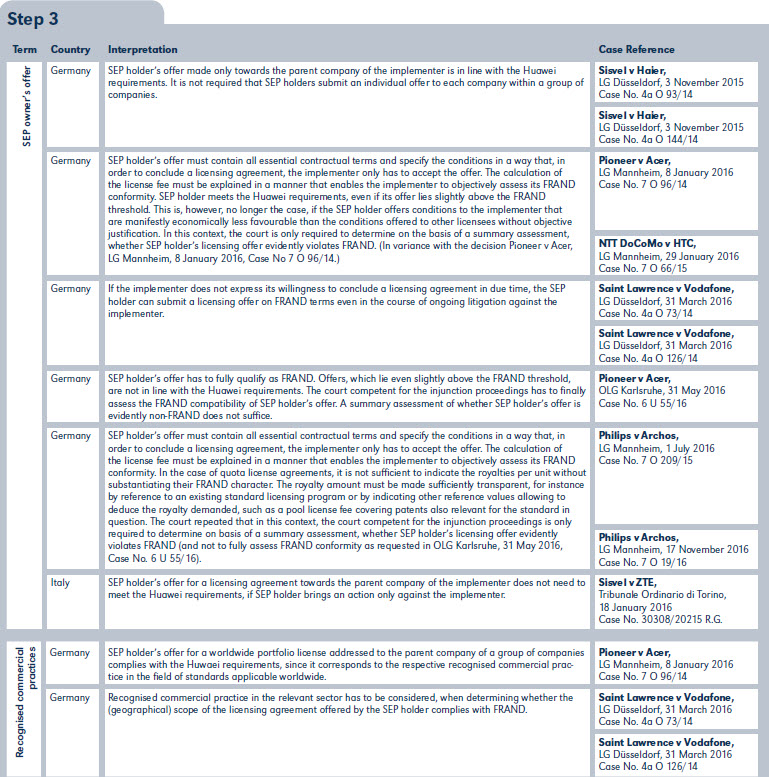

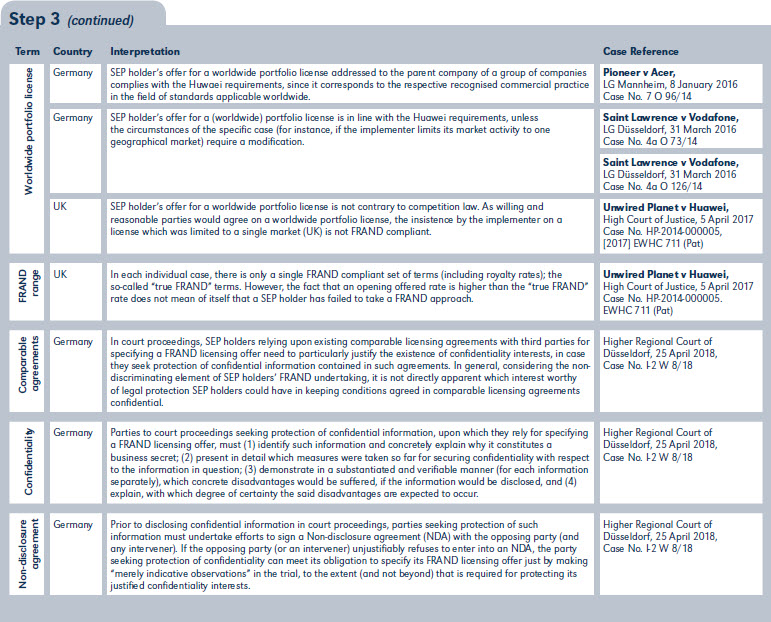
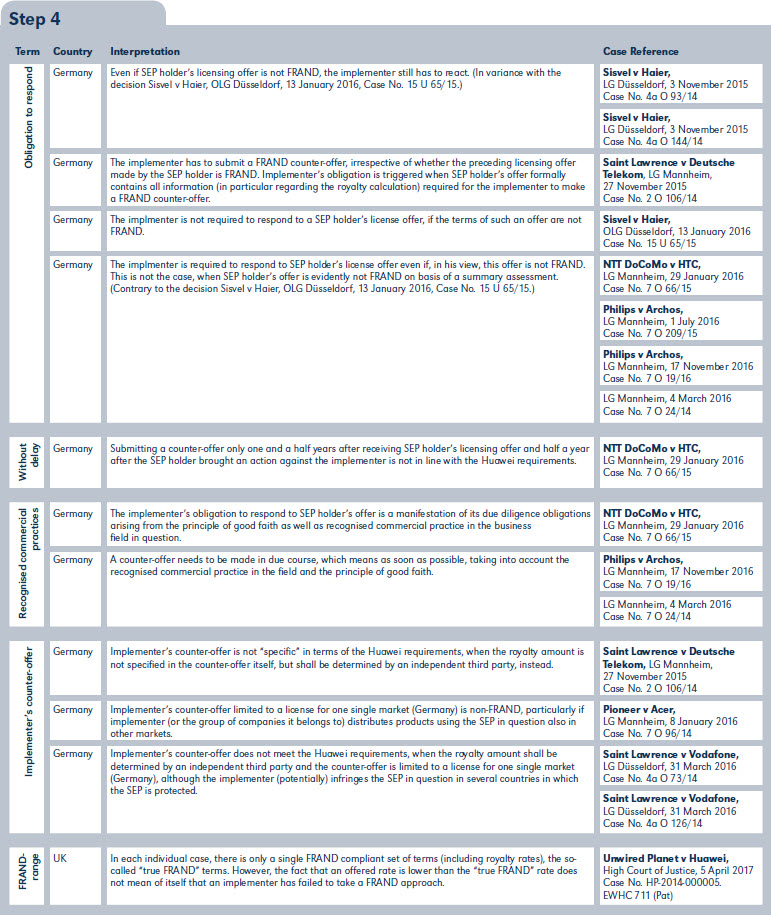
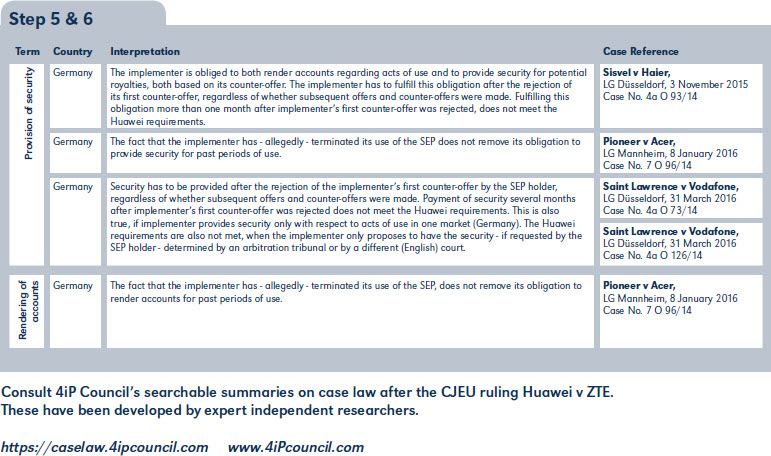
- By 2020, the number of IoT connections in Europe is expected to increase to almost six billion, leading to revenues amounting to approx. EUR one trillion; see European Commission, Definition of a Research and Innovation Policy Leveraging Cloud Computing and IoT Combination—Final Report (Luxembourg: 2016), 10, available at https://ec.europa.eu/digital-single-market/en/internet-of-things.
- European Commission, Communication From The European Commission To The European Parliament, The Council And The European Economic And Social Committee "Setting out the EU Approach to Standard Essential Patents" (Brussels, November 29, 2017) COM(2017) 712 final, 6
- Huawei v ZTE, Court of Justice of the European Union, Judgement dated July 16, 2015, Case No. C-170/13
- Ibid, para. 61
- See NTT DoCoMo v HTC, Landgericht Mannheim, Judgement dated January 29, 2016, Case No. 7 O 66/15; Philips v Archos, Landgericht Mannheim, Judgement dated July 1, 2016, Case No. 7 O 209/15
- See Unwired Planet v Huawei, UK High Court of Justice, Judgement dated April 5, 2017, Case No HP-2014-000005, [2017] EHWC 711 (Pat), para. 708.
- See Huawei v ZTE, Court of Justice of the European Union, Judgement dated July 16, 2015, Case No. C-170/13, para. 63
- See NTT DoCoMo v HTC, Landgericht Mannheim, Judgement dated January 29, 2016, Case No. 7 O 66/15; Philips v Archos, Landgericht Mannheim, Judgement dated July 1, 2016, Case No. 7 O 209/15
- See Huawei v ZTE, Court of Justice of the European Union, Judgement dated July 16, 2015, Case No. C-170/13, para. 65
- Ibid, para. 66
- If the royalty amount is not specified in the counter-offer itself, but shall be determined by an independent third party at a later point in time, the requirements set forth by the Huawei judgement are not met, see Saint Lawrence v Deutsche Telekom, Landgericht Mannheim, November 27, 2015 - Case No. 2 O 106/14, para. 232
- See Huawei v ZTE, Court of Justice of the European Union, Judgement dated July 16, 2015, Case No. C-170/13, para. 66.
- The implementer has to provide security and render account immediately after its first counter-offer was rejected by the SEP holder, regardless of whether subsequent offers and counter-offers were made, see Sisvel v Haier, Landgericht Düsseldorf, Judgement dated November 3, 2015–Case No. 4a O 93/14, para. 184 et seq. and Saint Lawrence v Vodafone, Landgericht Düsseldorf, Judgement dated March 31, 2016 - Case No. 4a O 73/14, para. 393 et seqq.
- Oberlandesgericht Düsseldorf, Judgement dated July 18, 2017, Case-No. I-2 U 23/17
- Ibid, para. 22
- Ibid, para. 22
- Ibid, para. 22
- Ibid, para. 22.
- See Saint Lawrence v Vodafone, Landgericht Düsseldorf, Judgement dated March 31, 2016 - Case No. 4a O 73/14, para. 273; Unwired Planet v Huawei, UK High Court of Justice, Judgement dated April 5, 2017, Case No. HP-2014-000005, [2017] EHWC 711 (Pat), para. 170; Microsoft v Motorola, US District Court Western District of Washington, Judgement dated April 23, 2013, Case No. C10-1823JLR
- Oberlandesgericht Düsseldorf, Judgements dated December 14, 2016 and January 17, 2017, Case No. I-2 U 31/16.
- Oberlandesgericht Düsseldorf, Judgement dated December 14, 2016, para. 1
- Ibid, para. 1
- Ibid, para. 5
- Ibid, para. 5
- Oberlandesgericht Düsseldorf, Judgement dated January 17, 2017, lit. II
- Sivel v ZTE, Landgericht Düsseldorf, Judgement dated July 13, 2017, Case No. 4a O 27/16.
- Ibid, para. 406
- Ibid, para. 408 et seq., 414
- Ibid, para. 412
- Oberlandesgericht Düsseldorf, Judgement dated April 25, 2018, Case No. I-2 W 18/18, para. 13
- Ibid, para. 24
- Ibid, para. 17 and 20
- Ibid, para. 12
- Ibid, para. 20.
- See Document 1159-1, filed by Apple on May 10, 2016, in the matter TCL Communication Technology Holdings v Telefonaktiebolaget LM Ericsson, U.S. District Court for the Central District of California, Case No. 8:14-CV-00341 JVS-DFMx, Case No. 2:15-CV-02370 JVS-DFMx.
*Dr. Claudia Tapia, LL.M. is Director IPR Policy at Ericsson and President of 4IP Council. Dr. Spyros Makris, LL.M. is Syndic Lawyer at Ericsson. The views expressed in this paper are those of the authors and do not represent the views of Ericsson or 4IP Council or any of its members.